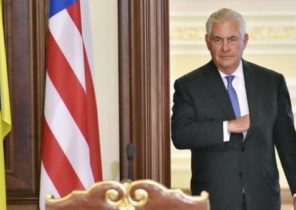The US President Donald trump may 21 reported that the U.S. intends to withdraw from the Treaty on open skies, signed with the allies and Russia, on the grounds that Russia has breached any of the contract rules. On the same day the U.S. state Department issued a statement that the United States believes that continued participation in the open skies Treaty no longer meets the interests, they intend to formally withdraw from the Treaty in six months, if Russia does not “return to compliance”.
The Treaty on open skies was signed in 1992 and entered into force in 2002. Currently there are more than 30 States parties, including Russia, USA, Canada, France, Germany and Ukraine. According to the agreement, the parties may conduct unarmed aerial reconnaissance on the territory of each other with the purpose of checking the fulfilment of the international Treaty on arms control in order to increase military transparency. The United States decision to withdraw from the agreement severely undermines the mutual strategic trust between Russia and America and also European countries, with the result that the newly applied a serious blow to the international system of arms control, and this caused widespread international concern.
So, kakimi plans are guided by the USA, leaving the open skies Treaty?
First, it is an attempt to gain a competitive strategic advantage to Russia. In accordance with the provisions of the contract, the resolution of the equipment on the ground used for aerial reconnaissance may not exceed 0.3 meters, and it has no advantages compared to active reconnaissance satellites, available from the United States. The United States has much more than Russia, the number of advanced satellites that can carry out a perpetual, comprehensive and highly effective intelligence against Russia. In other words, for Russia, the importance of observations using spy planes is much higher, and after the US withdrawal the damage will also be correspondingly greater.
Secondly, it is an opportunity to put pressure on European allies who are actively using American ground military equipment. According to statistics, every country participating will spend about a hundred reconnaissance flights over each other’s territories every year, 42 of them directed against Russia. Besides the US and Russia, most of the other parties to the Treaty on open skies are the European countries. Many of these States do not have their own reconnaissance satellites and can only rely on reconnaissance aircraft for information about Russia. To a certain extent, the existence of a contract is an important reason why European countries feel “calm” next to Russia and can reap the “peace dividend”.
However, according to the United States, if you imagine Russia as a common enemy of the US and Europe, it once again will emphasize the importance of America’s security. Therefore, States want to take the opportunity to put pressure on European allies and gather more real money for the so-called “roof”. In the past year, the United States withdrew from the INF Treaty, this year from the Treaty on open skies — all with the goal of exerting pressure on allies in Europe and reinforce their dependence on American technology.
Thirdly, there is the hope “to return the name” self-developed military power. Named cause of US withdrawal from the Treaty on open skies is the failure of Russia to the terms of this agreement: it has introduced “flight restrictions” for the United States, as well as reduced the duration of reconnaissance flights over its enclave of Kaliningrad. However, the States never talking about their own practice to include the Hawaiian Islands and other places in the “flight restrictions”. In the end, by wearing a hat “criminal world” on the head opposite side, they will look more “fair” and not only enhance the “legitimacy” of its own updates nuclear Arsenal and to strengthen missile defense, but they will also be much easier to win over to their side of the allies. From this point of view, the extension of the only remaining between the United States and Russia of the Treaty on arms control (the Treaty on measures for the further reduction and limitation of strategic offensive arms, start-III) in February next year will probably be very difficult.
Despite these grandiose plans, the United States decision to withdraw from the Treaty has caused a strong wave of protests both inside the country and abroad. The Chairman of the Committee of the U.S. house of representatives on foreign Affairs Eliot Engel and Chairman of the Committee on armed services of Congress Adam Smith in turn wrote letters to Secretary of state Mike Pompeo and Minister of defense Mark Esper, noting that the administration trump did not inform the Congress and convened a meeting before filing the notification of withdrawal from the Treaty to interested parties. Both diplomats demanded an explanation for this “deliberate violation”. European countries also did not want to stay “in the cold”: may 22 France, Germany, and the foreign Ministers of ten other European countries issued a joint statement which expressed their regret about the US decision to withdraw from the Treaty on open skies, and said that the output States does not mean that the contract is invalid, thus expressing readiness to continue to observe the terms of the agreement.
On the other hand, all the “decision to withdraw from unions” and “termination of contracts” of the United States in recent years to some degree also demonstrate the decline of their national power. For a long time, America relied on their own strength in putting pressure on opponents, acting on the principle “a lot of power — a little strategy.” Today the United States voluntarily provoke the major powers to compete among themselves, but they do not have absolute advantages in national power, so America definitely discreditied or intimidates strategic competitors by “setting inconvenient fact”, and uses every opportunity to create a protective Alliance against rivals. This process can be invented and used any insane fantasy, weird excuses and deceptive tactics.
In China there is a saying: the art of the donkey of Guizhou dried up (to struggle, to fizzle out, to exhaust all means – approx. TRANS.). Of course, people with great enthusiasm into stride, rather than donkeys, and if some technique is not working, they will think of new ways to achieve results. In the future we may see more demonstrations “imagination” of the United States.







